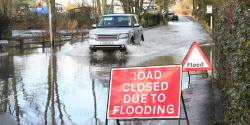

In the aftermath of the winter floods, the Forum of Private Business warns of the importance of planning ahead.
The country may currently be basking in late spring temperatures, but the recent floods have had an impact on businesses across the country, resulting in major disruption to operations and leaving a significant number counting the cost of the damage and facing hefty recovery costs.
“Many small business owners don’t like to think that that the worst might happen to their business,” says Jo Eccles, business adviser at The Forum of Private Business, “but when it does it can have devastating consequences.”
A reported one in five companies suffers a major disruption every five years and 92% of those affected by fire or flood never recover. If there is one valuable lesson we should take away from recent events, it's that the best thing you can do to protect your business is to be prepared.
“Trusting to luck simply isn’t an option," explained Eccles. "All too often crisis management and contingency planning are seen as the reserve of large multinationals but planning for a crisis and making sure that you have contingency plans in place to keep your small business going is essential and could be the difference between make or break should the worst happen.”
What is a crisis?
A crisis is a situation beyond the scope of everyday business, which threatens the operation, safety and reputation of your company. The exact nature may depend on your business' circumstances, but could include natural disasters such as storm and flood damage, theft or vandalism, fire, power cuts, fuel shortages, IT failure and industrial action.
Your crisis management planning process should start by assessing the likelihood of particular crises occurring to your business and possible frequency. You can do this by grading the probability of a crisis, then assessing each risk's possible impact on your business to decide how you deal with it. It is also important to consider how your customers would be affected by a crisis. Would they be likely to look for alternative suppliers? If you have service level agreements, would you be able to keep to them? What would happen if you couldn't?
Why you need a crisis plan
Above all, think about the things that would cause most disruption and that are most likely to happen to your business. Then make sure that your plan covers each of the risks. Ask yourself the following questions:
Remember that no plans are set in stone and you should regularly review and update your plan to reflect your business' changing circumstances, such as new premises or changes in staff. Ensure that all contact details are also correct.
Once you've identified the key risks your business faces, you need to take steps to protect your business against them and prevent them from happening in the first place. These can include:
To find out more about business continuity planning and how the Forum can help you prepare for the bad times as well as the good, visit www.fpb.org.
If you'd like to keep up-to-date with the latest developments in the heating and plumbing industry, why not subscribe to our weekly newsletters? Just click the button below and you can ensure all the latest industry news and new product information lands in your inbox every week.